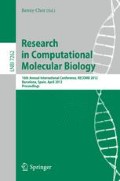Abstract
Motivation. Short tandem repeats (STRs), also known as microsatellites, are a class of genetic variations consisting of repetitive elements of 2 to 6 nucleotides that comprise hundreds of thousands of loci in the human genome. The repetitive structure of these loci makes them prone to replication slippage events [5] that can reach a rate of 1/500 mutations per locus per generation [8], 200,000 fold higher than the rate of de novo single nucleotide polymorphims (SNPs) [1].
Given their high mutation rate and large allele space, STRs represent a significant source of genetic variation and have been used in a plethora of applications in human genetics including forensics [3], anthropological applications [7], and tracing cancer cell lineages [2]. Additionally, STR expansions are implicated in the etiology of a variety of genetic disorders, such as Huntingon Disease [6] and Fragile-X Syndrome [5].
Access this chapter
Tax calculation will be finalised at checkout
Purchases are for personal use only
References
Conrad, D.F., Keebler, J.E., DePristo, M.A., Lindsay, S.J., Zhang, Y., Casals, F., Idaghdour, Y., Hartl, C.L., Torroja, C., Garimella, K.V., Zilversmit, M., Cartwright, R., Rouleau, G.A., Daly, M., Stone, E.A., Hurles, M.E., Awadalla, P.: Variation in genome-wide mutation rates within and between human families. Nat. Genet. 43(7), 712–714 (2011)
Frumkin, D., Wasserstrom, A., Itzkovitz, S., Stern, T., Harmelin, A., Eilam, R., Rechavi, G., Shapiro, E.: Cell lineage analysis of a mouse tumor. Cancer Res. 68(14), 5924–5931 (2008)
Kayser, M., de Knijff, P.: Improving human forensics through advances in genetics, genomics and molecular biology. Nat. Rev. Genet. 12(3), 179–192 (2011)
Langmead, B., Trapnell, C., Pop, M., Salzberg, S.L.: Ultrafast and memory-efficient alignment of short DNA sequences to the human genome. Genome Biol. 10(3), 25 (2009)
Mirkin, S.M.: Expandable DNA repeats and human disease. Nature 447(7147), 932–940 (2007)
Pearson, C.E., Nichol Edamura, K., Cleary, J.D.: Repeat instability: mechanisms of dynamic mutations. Nat. Rev. Genet. 6(10), 729–742 (2005)
Skorecki, K., Selig, S., Blazer, S., Bradman, R., Bradman, N., Waburton, P.J., Ismajlowicz, M., Hammer, M.F.: Y chromosomes of Jewish priests. Nature 385(6611), 32 (1997)
Walsh, B.: Estimating the time to the most recent common ancestor for the Y Chromosome or mitochondrial DNA for a pair of individuals. Genetics 158(2), 897–912 (2001)
Author information
Authors and Affiliations
Editor information
Editors and Affiliations
Rights and permissions
Copyright information
© 2012 Springer-Verlag Berlin Heidelberg
About this paper
Cite this paper
Gymrek, M., Golan, D., Rosset, S., Erlich, Y. (2012). lobSTR: A Short Tandem Repeat Profiler for Personal Genomes. In: Chor, B. (eds) Research in Computational Molecular Biology. RECOMB 2012. Lecture Notes in Computer Science(), vol 7262. Springer, Berlin, Heidelberg. https://doi.org/10.1007/978-3-642-29627-7_7
Download citation
DOI: https://doi.org/10.1007/978-3-642-29627-7_7
Publisher Name: Springer, Berlin, Heidelberg
Print ISBN: 978-3-642-29626-0
Online ISBN: 978-3-642-29627-7
eBook Packages: Computer ScienceComputer Science (R0)

